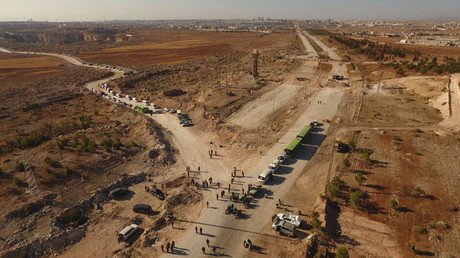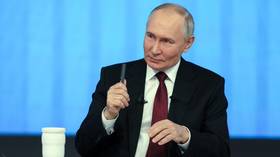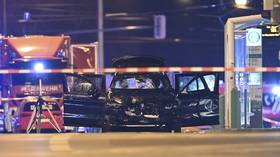Plan B: US considered arming Syrian rebels against Russian planes & artillery, report says
The US administration has been secretly considering sending more firepower to CIA-backed rebels fighting Syrian government forces, including weapons that can be used against Russian aircraft and artillery, according to a media report.
Citing US officials, who preferred to remain anonymous, the Washington Post reported the existence of a so-called ‘Plan B,’ which in case of "failed diplomatic efforts” provided for arming US-backed Syrian rebels with truck-mounted anti-aircraft weapons that could help rebel units “defend themselves against Russian aircraft and artillery.”
It says the plan was raised several times over the course of recent weekly White House meetings and was submitted to President Barack Obama during a National Security Council meeting on October 14.
The newspaper states, however, that ‘Plan B’ was “neither approved nor rejected,” with Obama reluctant to make any decision on the matter.
New arms supplies to the so-called moderate opposition could lead to the deaths of Russian military personnel who have been aiding the Syrian Army, and this could in turn cause a direct confrontation with Moscow, which Obama has been trying to avoid.
While the plan reportedly had supporters in the form of CIA Director John Brennan and Defense Secretary Ashton Carter, many were skeptical, including Secretary of State John Kerry.
White House sources also told the newspaper that the decision not to expand arms deliveries to Syrian rebels “reflects a growing skepticism” within the American administration regarding the expansion of a “covert CIA program,” through which it has been training and arming Syrian ‘moderate opposition’ over the past three years. This, in their words, has been the central element of the US strategy to put pressure on Syrian President Bashar Assad and force his resignation.
The US has been supporting fighters from the Free Syrian Army (FSA), founded in 2011 by officers of the Syrian Armed Forces who said their goal was to bring down Assad’s government. There have been a number of reports that the US-led coalition has been supplying FSA rebels with weapons, including surface-to-surface Grad rockets, especially after the Russian-backed offensive in Aleppo began. A US official told the Washington Post that the White House still considers the FSA the only force in Syria capable of prolonging the war and consequently succeeding in ousting Assad.
Washington and Moscow have opposing views on Assad, and this has been one of the main stumbling blocks stalling their peace efforts as chairs of the ISSG (the International Syria Support Group). But according to US officials, many now doubt that “even an expanded version” of the CIA’s plan could help US oust Assad as long as he is backed by Moscow.
“It’s a fine mess we’ve gotten ourselves into,” a former senior administration official who was involved in the Syria program early on is cited as saying. “There’s a huge risk here since the Russians entered […] The lesson out of this is that if you don’t take action early on, you should almost expect the options to get worse and worse and worse.”
He added that under current circumstances, the US president has “understandable reason for caution” in steps regarding the Syrian crisis, but noted that “the lack of a decision is a decision” in itself.
“The Russians have seized the initiative,” another senior administration official is cited by the newspaper as saying. “You can’t pretend you can go to war against Assad and not go to war against Russia.”
Last week, Damascus and Moscow stopped carrying out airstrikes in eastern Aleppo and opened a number of humanitarian corridors for those who want to escape the areas of the city controlled by terrorists and rebels in the hope that the break will lead to a complete ceasefire.
Despite the humanitarian pause having been prolonged several times, it ended on Saturday evening without significant achievements, as militants repeatedly sabotaged the ceasefire efforts, shelling humanitarian corridors and killing civilians. Over a thousand heavily-armed fighters have massed near eastern Aleppo, seemingly in preparation for a new offensive on the city. Moscow says the humanitarian pause will once again be prolonged only when the rebels stop violating the ceasefire.














